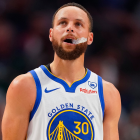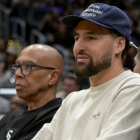 |
|
One down, one beard to go. (Getty Images) |
OKLAHOMA CITY -- Hours before he said it himself at his wedding, Thunder general manager Sam Presti got Serge Ibaka to say "I do."
That's right. The Thunder signed their shot-blocking big man to a four-year, $48 million deal on the same day Presti was getting married.
“I’m very much looking forward to getting off this conference call, no offense, and moving on to the second half of the day,” Presti said on a conference call. “I think it’s safe to say there’s not a fear of commitment on my end of the phone.”
Obviously, big congrats and best wishes to the happy couple, but it’s a different pair that Thunder fans are focused on. After the honeymoon, Presti has some work to do.
The big summer questions for the Thunder involved the future and how small market Oklahoma City could manage and maneuver paying both Ibaka and James Harden. With Ibaka done, immediately the questions turned to Harden and how that impacts him. Some see Ibaka’s deal done first and wonder if he was actually the priority and not Harden, like most expected.
“These type of things have their own tempo. Their own rhythm. They happen independently of one another,” Presti said of the negotiations interlocking. “Sometimes you get to that point a little bit sooner, but it doesn’t necessarily mean those conversations are at different rates or any indications of one way or the other.”
The Thunder are locked in on getting a deal done with Harden as well. There’s never been any of this “Harden or Ibaka?” talk within the organization. It’s all about keeping both and while Presti has always acknowledged challenges in doing that, he’s never shied away from that being the goal.
“We’re going to continue our conversations with James. We very much value him,” Presti said. “We want him to be part of the organization moving forward. We’re excited he’s a member of the Thunder and we hope he’ll be with us for years moving forward.”
It was always going to take an assist from the players in order to retain both and Ibaka certainly gave one. In a roundabout way, he took less money. How? Because think of it this way: If Ibaka were to reject a Thunder extension offer for less than the max (four years, $58 million) and wait until next summer where he was a restricted free agent, you can be sure he’d likely be a target for a max offer sheet from someone. It’s not hard to see what transpired this summer with Roy Hibbert and Brook Lopez and see which way the market is headed under this current collective bargaining agreement.
“We think [Ibaka]‘s important, but we also think his best basketball is ahead of him,” Presti said. “I can’t sit here and tell you that any of us anticipated Serge being a first-team All-Defensive player in just three years.”
Ibaka and his agent aren’t dummies. They know what the open market in the NBA would’ve looked like for a soon-to-be 23-year-old shot blocking power forward with a potentially limitless ceiling that was just named first team All-Defense. When you bring 29 other owners and general managers into the equation desperate to find building block young talent, Ibaka was going to get a max sheet, or close to it. Especially if Hibbert, Eric Gordon and Lopez did.
So Ibaka found a number he was comfortable with from the Thunder and avoided the open market where he probably would’ve landed an offer sheet that OKC couldn’t match. Simply by signing now rather than later, the Thunder got a hometown discount, in a way.
Obviously, you can apply that same thing to Harden as well. There’s no doubt about it Harden would command a max offer from somewhere. He knows it, and the Thunder do too. It might not result in major savings, but every penny less that the Thunder spend on these players is big money saved in the future. The luxury tax grows more and more punitive the higher over it you go. Spend $1 to $4,999,999 over the tax threshold and you’re paying $1.50 on every dollar over. Spend $5-9,999,999 over and you pay $1.75 on every dollar. That goes to $2.50 for $10-$14,999,999 and $3.25 for $15-19,999,999. (And guess when that more punitive tax kicks in? The 2013-14 season, right when Harden and Ibaka’s extensions start.)
Every dollar saved is a big deal. The Thunder are likely to still bust into the luxury tax if they retain Harden along with Ibaka, but depending on the deal, it could be manageable. There’s always been this assumption that OKC absolutely couldn’t go to the tax, like it was an impossibility. It’s not. It’s just much more challenging for a market like Oklahoma City that doesn’t have the same kind of big dollar TV deal like an L.A. or New York.
And to help the cause, the Thunder have players like Ibaka trying to do their part, while also taking care of their own business. It’s kind of an incredible culture the Thunder have established to inspire players to do that. Harden and Eric Maynor both alluded to making sacrifices to stay, while Russell Westbrook and Ibaka essentially took less money to do exactly that.
This was never an either/or situation for the Thunder with Harden and Ibaka. The Thunder want them both married to Oklahoma City for the long-term. And they’re one step closer to it.
















